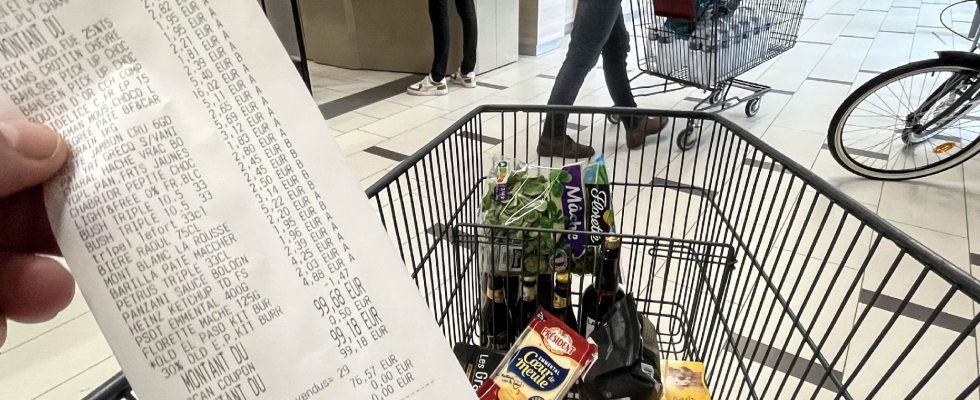This time it’s the right one. After two reprieves due to price swings in stores, the end of the systematic printing of paper receipts will come into effect on August 1, despite still high inflation. However, it is always possible to request it. Today, 12.5 billion receipts are printed each year in France. This represents 150,000 tons of paper, or 25 million trees cut and 18 billion liters of water consumed, according to Bercy.
“The minister had wanted a postponement when price inflation in supermarkets was at its maximum. (Gold) for several weeks, we have observed a decline in inflation”, explained the cabinet of Olivia Grégoire, acknowledging that inflation “remains very high” but ensuring that the ebb “will continue”. In April, the Bercy teams explained that “when you have 15% inflation on the shelves, the receipt is a benchmark for many French people”. Food inflation is still in double digits, measured at 13.6% over one year in June by INSEE (National Institute of Statistics and Economic Studies).
“I find it distressing. How are we going to check the transactions? And how are the companies and associations that use it as proof going to do?” Complained to L’Express, in December 2022, Sylvie, a thirty-something who lives in the Var. Several consumer associations, including UFC-Que Choisir and Rural Families, recalled that this ticket is “a tool for managing the family budget” for many households, which makes it possible to “verify the accuracy of the amount of the transaction”. Without a ticket, another problem: there is no proof of purchase in case of control or errors… “The default deletion of the ticket carries the seeds of an explosion of situations where the consumer will be deprived of the possibility to assert his rights”, assures UFC-Que Choisir.
Some exceptions
On the side of the cabinet of Olivia Grégoire, it is hammered that “it is not the abolition of the ticket or the prohibition of its issuance” in question on August 1, but “the possibility for the consumer to refuse the ticket of box”. In fact, the slip will not disappear: customers who wish can always ask for its printing, to clear up a doubt about a price for example. The Cnil, commission guaranteeing freedoms in the face of digital technology, published on March 10 its recommendations for the respect of privacy. Solutions exist to obtain a receipt without communicating personal details, for example the QR Code. In addition, the ticket will also be compulsory for durable goods.
In some cases, a ticket remains systematically printed: at the restaurant or at the hotel, when the guarantee must be mentioned on the ticket (for appliances or telephones for example), for canceled operations or even when the ticket concerns the provision of services (hairdresser, mechanic, etc.) for an amount greater than 25 euros. At the end of March, the Perifem association, which brings together distribution players around energy or environmental issues, estimated that the French are “still more than half to say they want to request a ticket in paper format”.
The measure is part of the law of February 10, 2020 on the fight against waste and the circular economy. On paper, she was far from unpopular. In March 2022, 53% of French people said they were certainly in favor of sending receipts digitally, according to an online survey by the company Opinea. Olivia Grégoire’s cabinet hopes that the entry into force of the measure in the middle of summer will “leave time to adopt the new reflexes at the start of the school year”. For their part, traders will all have to set up near the checkouts “a display which will explicitly say that it is now up to the consumer to ask for the receipt”. The Directorate General for Competition, Consumption and the Repression of Fraud (DGCCRF) will carry out checks on this point and will check “the consistency between the price displayed on the shelf and the price paid at the checkout”, adds Bercy.
A drop in a glass of water?
Concretely, what is wrong with the receipts? If they are recyclable, as confirmed by the site “What to do with the garbage ?” from Ademe (Environment and Energy Management Agency), the process is made more difficult because of their small size. Also in question: the presence of chemical reagents, sometimes dangerous, such as bisphenols (bisphenol A, endocrine disruptor, is no longer in the composition of receipts since 2015).
But what will be the ecological benefits? However, the impact of the measure as it will come into force on August 1 is not known. The independent media Green believes that “the dematerialization of proof of purchase with a PDF attached to an e-mail would only introduce a simple displacement of the environmental impact, according to the experts”.
